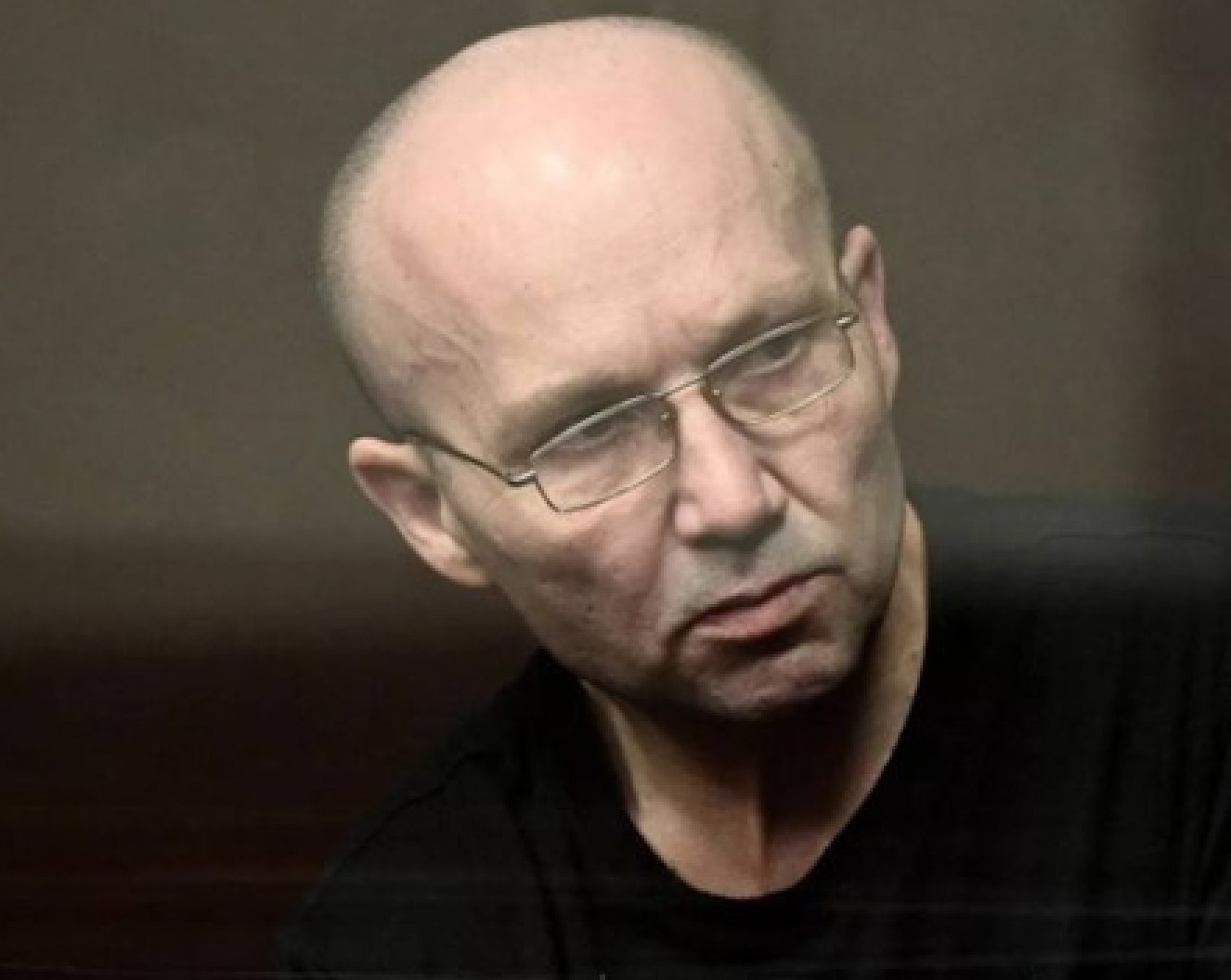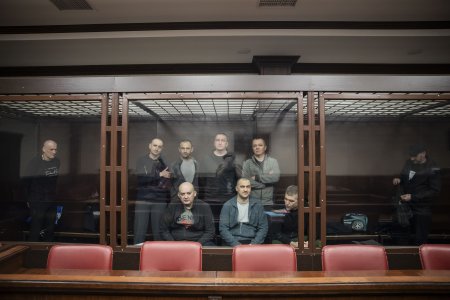
A Russian court has sentenced abducted Zaporizhzhia volunteer Dmytro Holubiev to 18 years’ harsh regime imprisonment in the first of a likely stream of fake trials and horrific ‘sentences’ for supposed ‘international terrorism’. In essentially all known cases, the Russian invaders have seized Ukrainians and held them totally incommunicado for many months before coming up with charges of astounding cynicism. The periods of isolation are used to obtain ‘confessions’ which those who are finally allowed to see independent lawyers invariably retract as having been extracted through torture.
Dmytro Holubiev is 50 and a taxi driver from Zaporizhzhia. Like other Ukrainians, he could not sit back and do nothing after Russia’s full-scale invasion of Ukraine. He was actively engaged in delivering humanitarian aid, in the form of medication and food for animals, to occupied Melitopol, and also helping local residents to evacuate.
According to his partner Anna Kupriienko, Holubiev had been planning to collect a mother and her child from Melitopol and take them back with him to Zaporizhzhia. Contact with him was lost on 11 August 2022, and for the next three months Anna had no idea what had happened to her husband. In November, Dmytro managed to get a note to her (probably via prisoners released in an exchange or lawyers helping political prisoners), telling her that he was held prisoner in the Simferopol SIZO ]remand prison] and was accused of ‘terrorism’. Anna dismisses any such charges as absurd and stresses that Dmytro led a normal life, working and bringing up the couple’s two children. She also points out that Dmytro has health issues and they were saving to get him a much-needed hip replacement.
It was Ukraine’s Centre for Journalist Investigations that learned (and informed Anna) that Russia was planning to put Holubiev ‘on trial’ at the Southern District Military Court in Rostov. ‘Judges’ from the latter and Rostov prosecutors have long taken part in Russia’s persecution of Crimean Tatar and other Ukrainian political prisoners, and are now being used for the illegal ‘trials’ Russia is staging of Ukrainian prisoners of war and also civilians abducted from occupied parts of Zaporizhzhia and Kherson oblasts.
It is unclear when exactly Holubiev was taken from occupied Crimea to Russia, and whether the lawyer mentioned on the court documents is one of his own choice, or a state-appointed lawyer.
The case was passed to the court in Rostov on 11 April, with TASS calling it “the case of a Ukrainian who blew up a road inspectorate in Melitopol”. It was claimed that he had also planned an explosion tin the building of the occupation ‘military-civilian administration building. The charges are truly insane, since the Ukrainian abducted by the Russians illegally occupying Ukrainian territory is accused of an act of ‘international terrorism’ under Russia’s criminal code (Article 361 § 1); of carrying out training in order to carry out terrorist activities (Article 205.3); Article 30 § 3 (planning a crime and attempting a crime), with a second charge of ‘international terrorism’ over the alleged attempt to cause an explosion.
It was claimed that Holubiev had, as an opponent of Russia’s war against Ukraine, been recruited “from the end of February to the beginning of August 2022” by an operative, identified as ‘Kovalenko’, from Ukraine’s Military Intelligence [HUR] and had undergone training on preparing and using homemade explosive devices. He had supposedly learned which sites to target from ‘Kovalenko’ and had brought the necessary components for creating explosive devices to occupied Melitopol. As mentioned, he is alleged to have carried out one attack, and been ‘thwarted’ from undertaking another.
On 22 November, prosecutor Sergei Aidinov, who has played a major role in getting huge sentences against many Crimean Tatar political prisoners, demanded 20 years in a harsh-regime prison camp.
On 23 November, ‘judge’ Maksym Mikhailovich Nikitin sentenced Holubiev to 18 years. TASS reported that, during his final address, Holubiev had admitted to blowing up the occupation road inspectorate and planning two other explosions but denied that this was ‘terrorism’.
Whether Holubiev did take part in any such acts of sabotage against an illegal occupying force is a question for when he is safely back in Ukraine. He is, in any case, undoubtedly correct in rejecting the charges of ‘terrorism’ and so-called ‘international terrorism’.
This is the first sentence of the latter charge, but a large number of Ukrainian civilians, and one or two prisoners of war, are currently facing the same surreal charges and appalling sentences. As reported, the charge of ‘acts of international terrorism’ was only added, as Article 361, to Russia’s criminal code, in 2016, and had previously not led to any convictions. According to the Russian criminal code, ‘an act of international terrorism’ refers to an explosion, act of arson or other actions, committed outside Russia and jeopardizing the life, health, freedom or inviolability of Russian citizens “for the purpose of violating the peaceful co-existence of states and peoples, or aimed against the interests” of Russia. You can be convicted of such a purported ‘act’ even if nobody was killed or injured. If there were fatalities, then the minimum sentence rises from 10 to 15 years’ imprisonment, with up to life imprisonment envisaged. The scope for abuse of this charge is huge, as one can even be convicted under this article for “a threat to commit such actions”, with such a ‘threat’ likely to be backed solely by ‘evidence’ or ‘testimony’ obtained by the FSB while a person was under their total control and without access to a lawyer.
As an occupying state, Russia is prohibited under international law from applying its legislation on occupied territory and from illegally transferring people to Russia. It is brazenly flouting such prohibitions, which it is doubtless aware of, as it hides behind such claims about ‘international terrorism’ and talks about ‘Russian citizens’. Russia is an invading power and those in positions of authority under the occupation regime are legitimate targets. Russia has no right to be bringing in Russian civilians and, verbiage aside, it is clear that the targets of the alleged acts were not civilians. There are also no grounds whatsoever for believing that any of the fundamental rights to a fair trial were observed. This was a politically motivated ‘trial’ with a predetermined outcome against a civilian hostage, abducted from his home and almost certainly tortured into providing false testimony while held incommunicado and without an independent lawyer.



